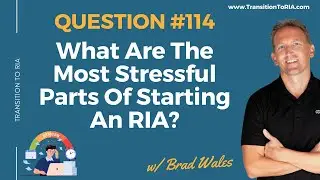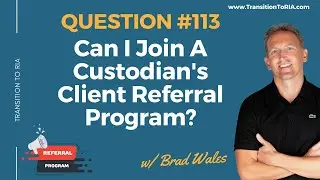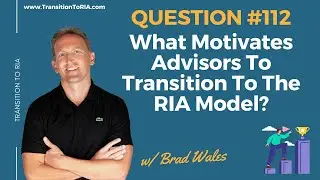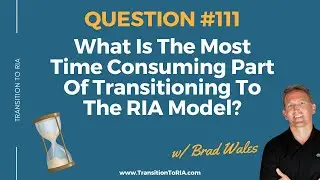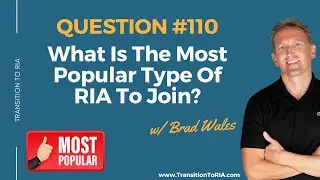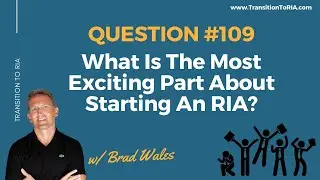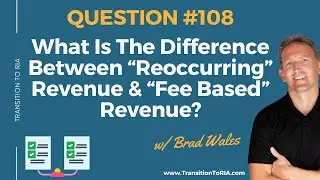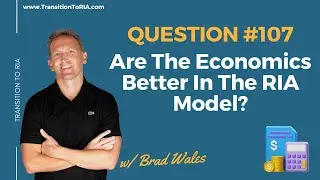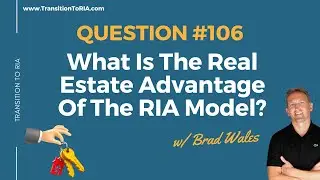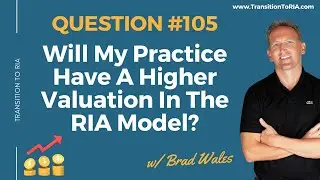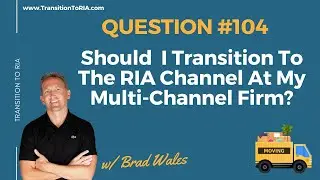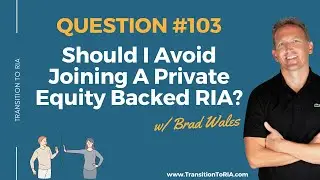What Motivates Advisors To Transition To The RIA Model?
Whether in our personal or professional lives, most everything in life revolves around motivations.
What motivates you to run your advisory practice as you do?
What motivates you to pursue certain hobbies and passions?
What motivates your kids to make the decisions they do?
When financial advisors and teams reach out to me to explore the RIA model, I typically start by asking what has motivated them to do so.
Having asked hundreds of advisors this question, the answers typically revolve around a desire for more flexibility with their practice, and/or better economics.
In this episode I provide examples of what the specific motivations often are.
I'm Brad Wales with Transition To RIA (TransitionToRIA.com). This is episode #112 of my question and answer series where I answer RIA related questions I get from advisors just like you.
What I do: At Transition To RIA I help financial advisors understand everything there is to know about WHY and HOW to transition their practice to the Registered Investment Advisor (RIA) model.
RESOURCES & LINKS
___________________________________________
🔹 Website: https://TransitionToRIA.com/
🔹 Show notes: https://TransitionToRIA.com/what-moti...
🔹 Contact me: https://transitiontoria.com/contact/
🔹 List of all questions I've answered: https://transitiontoria.com/videos/
🔹 Podcast: https://transitiontoria.com/podcast/
🔹 Whitepaper ("11 Ways The Economics Of The RIA Model Are Superior To Other Advisor Affiliation Options"): https://transitiontoria.com/whitepapers/
🔹 Transcription of video:
What motivates advisors to transition to the RIA model? That is today's question on the Transition To RIA question and answer series. It is episode #112.
Hi, I'm Brad Wales with Transition To RIA, where I help you understand everything there is to know about why and how to transition your practice to the RIA model.
If you're not already there, head to TransitionToRIA.com where you’ll find all the resources I make available from this entire series in video format, podcast format. I have articles, I have whitepapers. All kinds of things to help you better understand the model.
Again, TransitionToRIA.com.
On today's episode, we're going to talk about a subject that came to mind recently. I was thinking back to some of the classes I took in college. I ended up getting my MBA, this was a long time ago.
One of the MBA classes was a class called Organizational Behavior. The reason I remember that class all these years later is because that was the class I absolutely disliked. I dreaded going to it every time I had to walk in. I thought it was this touchy-feely topic about how people interact and how people work.
I was much more excited by the economics classes, the accounting classes, the finance classes. And here was this required Organizational Behavior class.
Perhaps like a lot of things in life though, as the years passed after I graduated and as I got older and wiser, it began to occur to me – this is why this has stayed with me all these years - is that class was arguably the most important class I had.
The reason is because at the end of the day it doesn't matter what the finance people think, or the accounting people think, or economics people think. If you are trying to run a business, trying to run a practice, trying to run a family, whatever it is in life, everything comes back to what motivates people.
That's what we're going to talk about on today's episode.
That Organizational Behavior class was structured around what motivates people to do things in life. Whether that's your kids you're hoping to motivate to make good decisions. Your team members, your staff, you hope to motivate to do certain things. Or what motivates you to do things in life, on a personal or professional level.
We’re going to talk about what motivates advisors to transition their practice to the RIA model.
When advisors or teams reach out to me - I encourage you to do the same – I typically start those calls/zooms by asking…. what has motivated someone like you to be reaching out to someone like me?
I love asking that question because I love hearing back from the advisors, the teams, what those motivations are. And no matter how it is articulated, and I've asked this question hundreds of times, the answers generally fall into two main buckets. That's what we're going to cover on this episode.
Those two buckets are a desire for more flexibility with the practice, and a desire to be able achieve the better economics that generally come with the model.
I'm going to give you some examples of both. These are not exhaustive lists of every imaginable item, but will give you an idea of some of the main motivations. Con't....
View remainder of transcription here: https://TransitionToRIA.com/what-moti...
Disclaimer: https://transitiontoria.com/terms/








